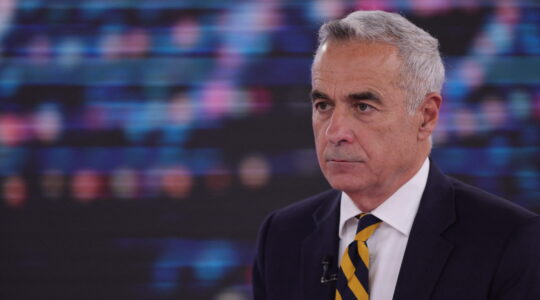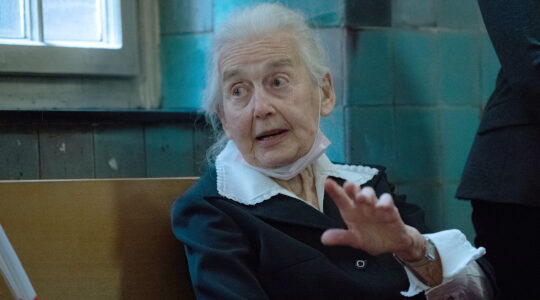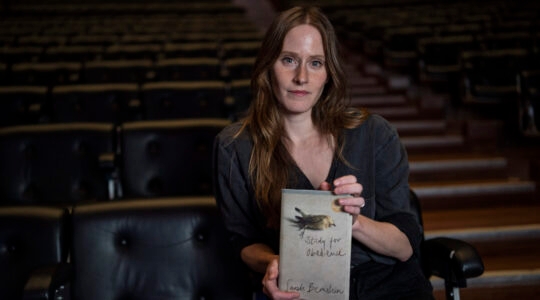TORONTO (JTA) — The love affair between Canada’s Jewish community and the country’s staunchly pro-Israel prime minister was readily apparent Sunday when Stephen Harper received a human rights award from the Canadian Jewish Congress.
Harper used the occasion of the CJC’s 29th plenary to announce that his government will introduce legislation in parliament that will allow terrorism victims to sue their attackers and their state sponsors in Canadian courts.
“This week in parliament, we will introduce legislation that will give victims of terrorism the power to obtain just compensation from those responsible for their suffering,” Harper said. The bill “will allow victims to sue perpetrators and sponsors of terrorist acts, including foreign states, in Canadian courts.”
The measure, Harper said, aims to send a “clear message that our government will hold the sponsors and perpetrators of terrorism accountable for their crimes.”
Harper’s speech, which was greeted with cheering by the 600-person audience, came after the congress named him a “true defender of human rights” with its annual Saul Hayes award.
Harper’s announcement creates a potential legal quagmire if foreign states are brought before Canadian courts, legal experts warned. It could subject friendly countries, such as India and even the United States, to court proceedings and legal penalties in Canada, depending on how the new law is written and how judges interpret it.
In the United States, individuals may sue foreign nations for terror-related crimes only if they are one of the four countries on the U.S. State Department’s list of state sponsors of terrorism: Cuba, Iran, Sudan and Syria.
In his speech, Harper reminded his audience that it was under his Conservative government that Canada became the first country in the world to cut political and financial ties to Hamas in Gaza, and the first nation to announce it would not attend the UN-sponsored Durban II conference, which took place in April in Geneva.
The Conservatives, whose pro-Israel pronouncements have lured many Jewish voters away from their traditional support for the Liberal party, also have funded security measures at synagogues and Jewish communal buildings, Harper noted.
“We remain among the world’s most vocal in opposition to not only the nuclear program of the government of Iran but also to its malevolent anti-Israeli and anti-Jewish declarations,” Harper said.
The prime minister used the occasion, which coincided with the CJC’s 90th anniversary, to burnish his pro-Israel credentials. He also slammed those who use the veneer of opposition to Israel’s government as “an intellectually respectable cover for anti-Semitic discourse.”
“It is all too common nowadays for politicians to claim to support Israel and the Jewish people. Yet when Israel is attacked for the umpteenth time, because its enemies refuse to accept the right of the Jewish state to exist, these same politicians are quick to condemn Israel, to accuse it of war crimes and to demand that it unilaterally suspend its right to self-defense,” he said. “You will not hear that kind of double-speak from our government — ever.”
The daylong plenary also heard from the new leader of the opposition Liberals, Michael Igantieff, who took a jab at a remark Harper made in 2006, when he called the contenders for the Liberal leadership “anti-Israeli.”
Harper had made the remark in response to Ignatieff’s comments that an Israeli airstrike during the Israel-Hezbollah war of 2006 was a war crime. Ignatieff later apologized for the remark.
Ignatieff told the CJC plenary it is “reckless for political leaders to try and score points by branding one another as anti-Israel, to try to win votes by claiming a monopoly on support for Israel.”
He went on, “My party will never claim to be the only genuine defenders of Israel in Canadian politics, because I don’t want my party to be alone in the defense of Israel, I want all parties to defend Israel.”
Also on Sunday, Harper was honored in Toronto by the Friends of the Simon Wiesenthal Centre for Holocaust Studies, which awarded him the Simon Wiesenthal International Leadership Award. Attendees included Israel’s vice prime minister, Silvan Shalom, former Australian Prime Minister John Howard and former U.S. Secretary of Homeland Security Michael Chertoff.

Help ensure Jewish news remains accessible to all. Your donation to the Jewish Telegraphic Agency powers the trusted journalism that has connected Jewish communities worldwide for more than 100 years. With your help, JTA can continue to deliver vital news and insights. Donate today.





